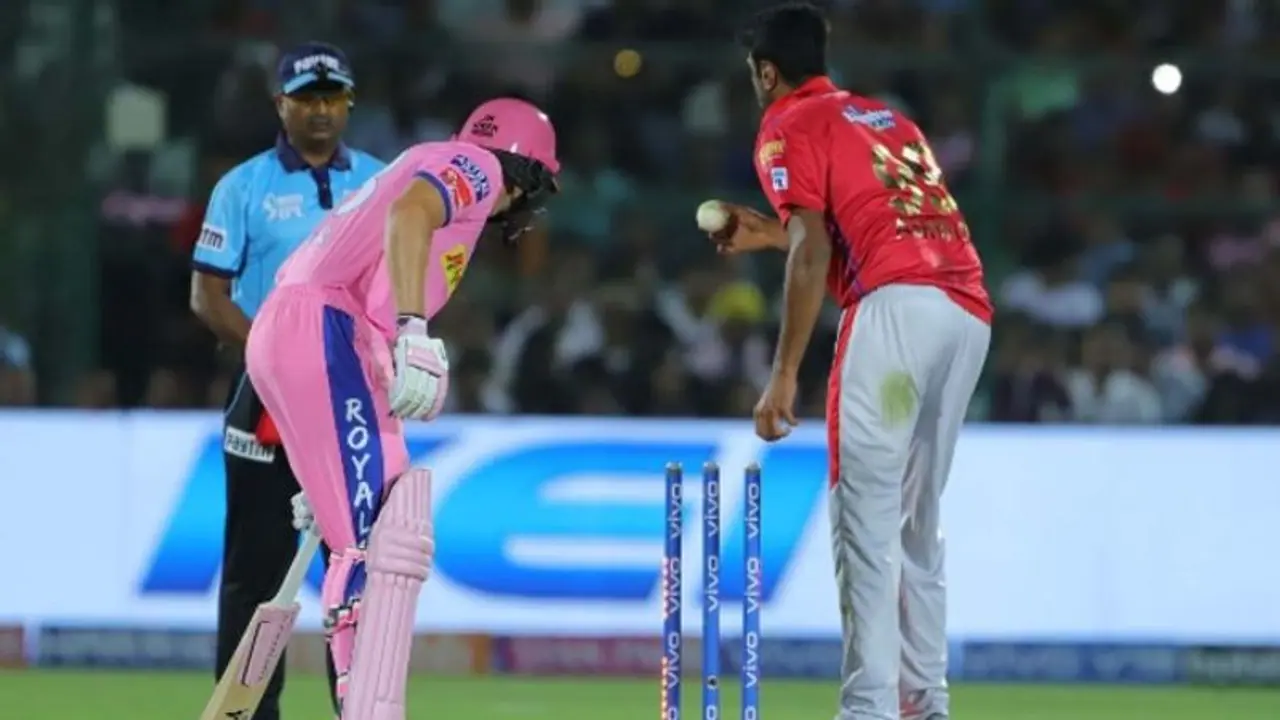"On my part, it was very instinctive (mankading of Jos Buttler in IPL 2019). It wasn’t planned or anything like that. It’s there within the rules of the game. I don’t understand where the spirit of the game comes (in). Naturally, if it’s there in the rules it’s there," Ashwin said. Here is a full list of batsmen 'mankaded' in cricket since 1947
Bengaluru: For and against debates continue to rage after Kings XI Punjab (KXIP) captain Ravichandran Ashwin ‘mankaded’ Rajasthan Royals (RR) batsman Jos Buttler in an Indian Premier League (IPL) 2019 game in Jaipur on Monday night.
While Ashwin was playing within the rules of the sport, many questioned the off-spinner for not playing in the spirit of the game. Later, the bowler himself defended his act saying it was “instinctive”.
Also read: Reactions from Twitter to Ashwin's 'mankading' act
"On my part, it was very instinctive. It wasn’t planned or anything like that. It’s there within the rules of the game. I don’t understand where the spirit of the game comes (in). Naturally, if it’s there in the rules it’s there," Ashwin said after the match, which was won by his team.
This was the first time ever that such a dismissal was seen in the 12 years of IPL. However, there have been instances of ‘mankading’ in international cricket and other competitive matches.
The mode of ‘mankaded’ dismissal was first seen in 1947 when India’s Vinoo Mankad ran out Australia’s Bill Brown in a Test in Sydney. Mankad had earlier effected a same dismissal on Brown in a warm-up game.
There have been instances of bowlers warning non-strikers when they are leaving the crease early before the ball is delivered. However, in Ashwin’s case he did not warn the England wicketkeeper-batsman.
In 2012, Ashwin had ‘mankaded’ Sri Lanka’s Lahiru Thirimanne in an ODI but India’s stand-in captain Virender Sehwag withdrew the appeal. At the time, Ashwin had warned the batsman for backing up too much.
Back in 1947, when the media had criticised Mankad, Australian captain Don Bradman had defended his action.
“For the life of me, I can't understand why (the press) questioned his sportsmanship. The laws of cricket make it quite clear that the non-striker must keep within his ground until the ball has been delivered. If not, why is the provision there which enables the bowler to run him out? By backing up too far or too early, the non-striker is very obviously gaining an unfair advantage,” Bradman wrote in his autobiography.
Here is what the law states
41.16 Non-striker leaving his/her ground early: If the non-striker is out of his/her ground from the moment the ball comes into play to the instant when the bowler would normally have been expected to release the ball, the bowler is permitted to attempt to run him/her out. Whether the attempt is successful or not, the ball shall not count as one in the over.
If the bowler fails in an attempt to run out the non-striker, the umpire shall call and signal Dead ball as soon as possible.
'Mankading' dismissals in international cricket
Tests
- 1. Bill Brown (Australia) by Vinoo Mankad (India) — Sydney (1947)
- 2. Ian Redpath (Australia) by Charlie Griffith (West Indies) — Adelaide (1969)
- 3. Derek Randall (England) by Ewen Chatfield (New Zealand) — Christchurch (1978)
- 4. Sikander Bakht (Pakistan) by Alan Hurst (Australia) — Perth (1979)
ODIs
- 5. Brian Luckhurst (England) by Greg Chappell (Australia) — Melbourne (1975)
- 6. Grant Flower (Zimbabwe) by Dipak Patel (New Zealand) — Harare (1992)
- 7. Peter Kirsten (South Africa) by Kapil Dev (India) — Port Elizabeth (1992)
- 8. Jos Buttler (England) by Sachithra Senanayake (Sri Lanka) — Birmingham (2014)
Other cricket
Under-19 World Cup 2016
- Richard Ngarava (Zimbabwe) by Keemo Paul (West Indies) — Chittagong (2016)
BCCI Women's Under-19 tournament
- Ambika Debnath (Tripura) by Iqra Rasool (Jammu and Kashmir) — Panaji (2019)
Vinoo Mankad Trophy
- Denish Das (Assam) by Pankaj Yadav (Jharkhand) — Surat (2018)
Ranji Trophy
- Sandipan Das (Bengal) by Murali Kartik (Railways) — Delhi (2013)
England County Championship
- Alex Barrow (Somerset) by Murali Kartik (Surrey) — Taunton (2012)
